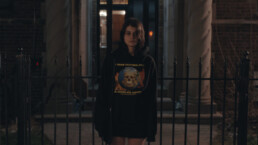'Sly Lives! (aka The Burden of Black Genius)' Review: Heavy is the Head that Wears the Crown
Ahmir "Questlove" Thompson's follow-up to his 2022 Oscar-winning documentary Summer of Soul (...Or, When the Revolution Could Not Be Televised) is another timely watch. Sly Lives! (aka The Burden of Black Genius) energetically pays tribute to the life and legacy of the memorable American funk band, Sly & the Family Stone. Using an abundance of archival footage and interviews with key players in the scene, including André 3000, Clive Davis, and Chaka Khan, Sly Lives! is a captivating look at the good times–and bad–of one of pop music's most influential artists. The documentary held its World Premiere at the 2025 Sundance Film Festival and is now available to stream on Hulu.
Heavy is the Head that Wears the Crown
Bigger than just an homage-filled tribute to the band Sly & the Family Stone, Questlove's thesis is more nuanced and pointed than the average music documentary. Using Sly Stone as his subject, Questlove investigates and interrogates the idea of Black genius and the expectations that come with it. "What is 'Black Genius'" he asks the interviewees at the beginning of the film. The responses range from lighthearted chuckles to introspective contemplation. It's a tricky question to answer. Even at the end of the film, the question remains fluid and ever-changing.
Watch the Sly Lives! (aka The Burden of Black Genius) trailer here.
The Rise, Reign, and Fall of Sly & the Family Stone
Those interested in learning how this group from San Francisco came to dominate the music scene will find much to sink their teeth into in this joyous and academic retrospective. Dubbed a "music genius" by those who knew him, Sly Stone–born Sylvester Stewart–was destined to be a game-changer. Equally charismatic and enigmatic, Sly's first foray into the music industry came as a DJ in the Bay Area of California. The documentary expertly tracks how the band became one of the most groundbreaking bands of the 60s. Notably, they were the first major group to have both a multi-racial and mixed-gender roster.
The film covers all of their highlights, including performances of hits "Everyday People" and "Hot Fun in the Summertime". It also covers the not-so-glamorous moments, including the dissolution of the group, friction between band members, and Sly's out-of-control drug use. It's during these moments that Questlove reinserts his original thesis statement: There is an unseen burden that comes with success for Black artists in America.
Takeaway
Sly Lives! doesn't quite live up to the same "must-see" energy as Questlove's former film Summer of Soul. However, what it does provide in its nearly 2-hour runtime is a vivid memory of the legendary contributions from a West Coast rock band that changed the trajectory of rock and funk music forever.
'I Love You Forever' Review: Heartbreak at the Hands of a Narcissist
Prince Charming quickly turns into Prince Creepy in the indie romantic drama I Love You Forever. Co-written and co-directed by Cazzie David and Elisa Kalani, I Love You Forever shows how one millennial meet-cute went from giddy heart-eye emoji to toxic heartbreak. This film is not the first to shed light on the modern dating experience, however, its portrayal of an increasingly frightening dynamic between a young woman and her overly obsessive boyfriend offers a fresh and authentic perspective on cultivating love in 2025.
Happily Ever After... Or Is It?
Mackenzie (Sofia Black-D'Elia) is in a dating rut. Her hook-up buddy continues to be ambivalent about their relationship, and her patience is running low. A stressed-out law student, Mackenzie doesn't have time to waste on boys who won't commit. But her pessimistic outlook on love changes the night of her best friend's (Cazzie David) birthday party. This is where she meets Finn (Ray Nicholson), a devastatingly handsome man who seems immediately smitten with her. Their chemistry is undeniable from the beginning. For their first date, Finn rents out an entire restaurant for just the two of them. They end the night with a kiss, and it can easily be described as the best date ever.
Finn's thoughtfulness and attentive communication style seem like considerate personality traits. At last, Mackenzie believes she has found the one. Early on, Finn shares his early childhood trauma and fear of abandonment, and Mackenzie sees this confession as being vulnerable, open, and honest. Little does she know that his relationship anxiety and insecurity will be the very things that ruin her life.
Crafting the Tone of the Tragic Rom-Com
I Love You Forever is a painfully authentic embodiment of heartbreak at the hands of a narcissist. Those who have experienced a relationship like this may feel as if your diary entries are being read aloud. The film depicts outrageous, yet very real manipulation tactics, like being pressured into changing your phone number, and the stress of having to de-escalate a situation after threats of suicide.
Crafting the tone of a tragic rom-com is no easy task, but Cazzie David and Elisa Kalani make it seem effortless. The script's zingy one-liners add much-needed lightheartedness, as does Cazzie David's dry comedic relief. Ray Nicholson puts on a stunning performance as the endearing-turned-creepy Finn. His ability to switch between sweet and psychotic is impressive. For her role as the tortured girlfriend, Sofia Black-D'Elia gives a heartfelt performance that many women may, unfortunately, relate to.
Takeaway
Emotionally abusive relationships are no laughing matter. I Love You Forever handles this delicate subject matter with the right amount of empathy and dark humor. Produced in part by Diablo Cody, the film made its World Premiere at the 2024 SXSW Film Festival.
'Outrage' Review: The Scary Simplicity of How Disinformation Spreads With Ease
Writer/director Brady Nelson uses his independent film Outrage to make a point: you can't always trust what you read online. This high-stakes drama, made on a modest $20,000 budget, tells a scandalous and timely story of corruption in mainstream media. Over the last decade, the internet has been heavily used to weaponize democracy. This results in hit pieces, callous invasion of privacy, and spreading fake news with the deliberate intent to cause chaos. Outrage approaches this unethical PR tactic from a new perspective, and exposes the ugly truth of media manipulation.
Witnessing a Political Scandal
Kevin (Alex Campbell) is a young investigative journalist who has been working undercover at a troll farm, during an election year, to expose a giant media manipulator. The son of a highly respected journalist, Kevin strives to make a name for himself outside his father's shadow. The assignment he finds himself involved in, is by all intents and purposes, a career-defining opportunity. Kevin's task is to swing the election for the far-right candidate. This involves planting salacious news stories at various news organizations, creating memes, and other low-level online attacks.
By playing along as a troll farmer and witnessing this company's ability to manipulate public opinion during a critical voting period, Kevin's goal is to expose the corrupt organization and its leader (Paul Stuart). However, once Kevin sees how far the company's boss is willing to go to win, he realizes he may be in too deep. It's a risky move, but that doesn't stop Kevin from attempting to dismantle the PR machine before it's too late.
How Fake News Can Have Real and Devastating Effects
Outrage shows the scary simplicity of how disinformation spreads with ease. The film feels particularly timely given our recent election and the discourse surrounding "fake news" and rumored voter fraud. It's not improbable to imagine troll farms around the world aiding specific political parties and how that has a direct influence on the state of our country. Phrases like "ABC: Always Be Clicking" and "People don't want to think", indicating that the power lies in the hands of click-farm bots, are enough to leave a bitter taste in anyone's mouth.
Set in a single location, an office building within an industrial complex, filmmaker Brady Nelson is able to build a pressure-cooker environment. Outrage moves very swiftly, much like a fast-paced newsroom. Close-ups of computer screens and text messages draw audiences into this digital world. At times, the depiction of the World Wide Web feels more like a jail cell.
Takeaway
Inspired by true events, these manipulation tactics are commonly used in our current landscape, from TMZ gossip sites to more political-leaning outlets. Outrage puts a face to these otherwise hidden ethical dilemmas of modern journalism and digital deception for all to see.
'Celebration' Review: The Tragic Trajectory of Innocent to Ideological
Filmmaker Bruno Anković looks at the past to better understand the present in the historical drama Celebration (Proslava). Inspired by the book of the same name, Celebration by Damir Karakaš, Anković revisits a specific and divisive moment in time that has forever left an imprint on world history and politics. Celebration made its World Premiere at the 2024 Karlovy Vary International Film Festival.
The Tragic Trajectory of Innocence to Ideological
Bernard Tomić plays Mijo, a young, defeated soldier who finds refuge in the woods outside his impoverished Croatian village. It is Autumn 1945, at the end of World War II, and Mijo has gone into hiding in fear of retaliation. He cannot fathom surrendering and facing the consequences of his actions, which are the result of right-wing brainwashing. Mijo, who grew up an innocent, good-natured kid, is interestingly both the protagonist and antagonist of this story. So how did Mijo, a good kid with a pure heart, end up complying with the "enemy"? Through eye-opening flashbacks, Celebration explores the monumental events and difficult circumstances that led to Croatia's expansion of extremism and right-wing ideology.
Brutal Circumstances are Amplified by Aesthetic and Sound
Celebration is Bruno Anković's feature film debut and a successful one at that. Capturing the bleak and conflicting circumstance that Mijo finds himself in is amplified by gritty aesthetics. The score has an interesting cadence to it, almost sounding like high-pitched wind rather than a traditional composition. Visually, the film has a Terrence Malick quality, specifically in the scenes of lush rural landscapes. At times, the color grade can be too dark and hard to distinguish what is happening on screen, which is the film's only flaw. Creating something so beautiful out of subject matter that is so difficult to digest is a true feat.
As a Croatian filmmaker, this story is deeply personal to Anković. However, he is convinced that history is repeating itself, and therefore Celebration is a global foreshadowing of what condoning evil entities would look like today. Anković explains it best: "I wanted to use this film to try to explain to myself why our grandfathers became so cruel, why they could ever be part of the Nazi and fascist movements. I simply had a need to talk about the type of environment in which evil could take root. Particularly in light of the world today – in Europe and all over the world we can now see the resurgence of right-wing movements, groups, politicians – so we ask ourselves: where did we all go wrong?"
Takeaway
Celebration acts as a mirror for the younger generations to recognize the warning signs of impending political turmoil and a catalyst to act accordingly. We cannot remove the stains of the past but it is in our power to ensure our future is equitable, prosperous, and something we want to look forward to.
'Going Viral' Review: Would You Sell Your Soul For Fame?
The desire for virality might seem like a modern-day ambition, but Going Viral proves that the search for stardom is timeless. Directed by Vincent Vittorio (American Made Movie) and written & produced by Todd Pringle and Kevin Greene (You’re Killing Me), this independent feature blends the best of 80's nostalgia with current technological advances to create a truly original genre film. This 80s sci-fi adventure is full of great music, fun special effects, and a stellar cast. And wow! It is fun to see Corey Feldman back on the big screen again!
Welcome to Viral University
Going Viral tells the story of a teenage boy's desperate attempt to achieve fame and the consequences he faces as a result. Beckett O’Connell (Shea Pritchard) is an awkward 15-year-old obsessed with skateboarding and becoming an influencer on V-TV, a new video-sharing platform. Similar to our generation's TikTok, V-TV rewards its users with likes and online fame. For months, Beckett tries and fails to get attention from the V-TV community. However, things change when he discovers Viral University, a surreal online portal. This is also where he meets Mr. Viral (Louis Kyper), a mysterious AI who promises success by encouraging fame-hungry teens to engage in practical jokes.
Following Mr. Viral's advice, Beckett starts by partaking in innocent yet annoying pranks. Just as expected, his popularity begins to rise. The girls at school start to pay him attention, and he begins to be recognized by people around town. Beckett's harmless practical jokes eventually turn dangerous when he goes too far by rigging an opponent's skateboard, causing serious injuries. It's no longer fun and games as Beckett realizes that Mr. Viral is more threatening than he was led to believe. With so much at stake, Beckett must team up with a reclusive gamer named Samurai (Corey Feldman) to take on the AI once and for all.
A Neon Nod to 80s Culture
Filmmaker Vincent Vittorio excels in creating an aesthetically abundant 80s haven within the world of Going Viral. From the costumes to the props and the crowd-pleasing synched songs, Going Viral is a fun and family-friendly watch. In his role as the aging yet infamous gamer, Corey Feldman steals the show with his comedic timing and undeniable charisma. Leading the film, Shea Pritchard does an equally impressive job channeling his inner Marty McFly while remaining a unique central character.
Takeaway
Imagine Ferris Bueller had a Gen Z desire for influencer fame, and you'll have a good idea of what to expect in Going Viral. Full of heart and sideways ponytails, this vibrant indie film tackles the timeless challenges of self-discovery in the digital age.
'The 4 Points' Review: Exposing the Gritty Underbelly of LA Crime
Beyond the bright lights of Hollywood is a grittier, less fairytale-like part of town that many avoid for good reason. This stretch of the city, which was once considered the gang capital of the world, acts as a playground for those up to no good. Filmmaker Raul Perez examines this seedy underbelly in the independent crime drama The 4 Points. Not only is The 4 Points a passion project for Perez, which he has spent years in various stages of production, but it also marks his narrative feature film debut.
Rival Gang Members Turned Unlikely Partners
Co-written with longtime friend Kevin J. Kelley, Perez draws audiences into the world of high-stakes crime where murder rates are skyrocketing. Two former gang rivals turned LAPD detectives, Shane Murphy (Dustin Harnish) and Dre Allen (Dominique Marsell), know these streets well. After all, they came of age in the city's most violent neighborhood, referred to as The 4 Points. After a startling number of murders catch the attention of the police commissioner, Detectives Murphy and Allen are assigned to a "two-man task force" to investigate the root cause. As the duo digs deeper into the darkness, they quickly get tangled up in a deadly web of secrets, gang violence, and betrayal. Their attempt to save the city from The 4 Points could be the very thing that kills them both.
A Character-Driven Crime Saga Anchored by Strong Performances
The 4 Points doesn't shy away from depicting graphic moments on screen, including violence and drug use. This sensitive subject matter is handled with care by lead actors Dustin Harnish and Dominique Marsell. Unflinching in their portrayal of formerly troubled men who have turned their lives around, they command this indie film. The psychological toll their portrayal evokes is visceral and deeply felt.
While gripping, there are a couple of moments that can take the viewer out of the experience. For instance, the sound mix is off in certain scenes. The quick escalation from soft dialogue to elevated and startling sound effects can cause quite a jumpscare. Visually, however, is where The 4 Points experiments with stylistic choices that pay off. The camera's choreography dances around characters and the decision to go handheld over static shots adds a sense of urgency that perfectly compliments the film.
Takeaway
In addition to its adrenaline-pumping moments, The 4 Points also offers a heartfelt undercurrent that explores themes of redemption and brotherhood. Winner of "Best Indie Feature" at the San Francisco International Film Awards, The 4 Points is now available on VOD.
'The Touch (Dodir)' Review: A Story of Longing and Loving
Croatian directors Marko Visković and Erik Kyle Lončar prove that love is never really lost in their short film The Touch (Dodir). Shot in a single location for a modest $1,000 production budget, the result is a moving portrait of a woman in mourning who is comforted by faint signs from the afterlife. In its 13-minute runtime, the film successfully tackles deep themes of sisterhood, grief, and the resiliency it takes to keep going.
Gone but Not Forgotten
Dolores (Ivana Visković Pavić) is shocked by the sudden passing of her sister Hana (Sanja Pavić). Alone in her apartment, Dolores tries to make sense of the unforeseen tragedy as she awaits her husband's return from an out-of-town business trip. Isolated from her family and friends, Dolores notices strange happenings around her. For instance, the tissues she has been using to wipe away her tears suddenly move. It evokes a feeling Dolores has that she isn't really alone despite no one being around her. Dolores slips into an awakened state where she physically senses her sister. This surreal and blissful moment causes Dolores to revisit her view on life, death, and family.
Melancholy Reflected in Memorable Ways
The film's title treatment acts as a creative foreshadowing of the short story. Two different fonts make up the word "Dodir", with the modern half blending into the more cursive, spiritual-looking half. This acts as a direct interpretation of Hana's spirit crossing over into Dolores' physical realm. Another interesting stylistic choice is the decision to limit excessive dialogue. Most of The Touch (Dodir) is accompanied by a light score rather than heavy verbal cues.
Takeaway
When a loved one passes, it's understandable to fall into a state of grief and sadness. In The Touch (Dodir), Marko Visković and Erik Kyle Lončar show that one can find comfort in a spiritual relationship after loss. And just because one's physical form is no longer present in reality, doesn't always mean that they are gone.
'The Space Rodent' Review: This Campy Comedy is a Fun Take on the Sci-Fi Genre
Halloween is the perfect gateway holiday for audiences to forget the confines of reality and expect the unexpected. In multi-hyphenate filmmaker Jason D. Morris' screwball sci-fi comedy The Space Rodent, any semblance of normalcy is lightyears away. What Morris conjures throughout the film's 80-minute runtime is a delightfully bonkers take on the alien invasion genre. If you've ever wondered how the Scooby Doo gang would react to mysteries if they were in their 30s, The Space Rodent gives you a pretty good idea.
Alien Trash Pandas From Outer Space
The film takes place in modern-day Cavell, Illinois. It's Halloween night and a group of friends, Mac (Robert Carrera), Dean (David Minard), Amanda (Leah Bernard), and Skyler (Shelby Broadnax), embark on their separate holiday plans. The men plan to stay home and not pass out candy while their partners enjoy the festivities at a party out of town. Mac and Dean are excited to catch up but don't get to enjoy their bro time for long. A teenager dressed as The Crow (Ty Pennington) rudely interrupts them by trick-or-treating. Frustrated that she didn't read the warning sign "Ring the Doorbell and DIE!", Mac and Dean annoyingly begin to educate the teen on how inappropriate it is for someone her age to beg for candy. Just as the teen claps back, a strange Earth-shaking disturbance crash lands on the front lawn.
At the same time, Amanda and Skyler also become derailed by a terrifying alien rodent. Part bear, part rat, this alien creature threatens to destroy everything in its path. Amanda and Skylar rush home to find Mac and Dean fighting off their own otherworldly creature, who they charmingly call an "alien trash panda" and "zombie cat". As chaos unfolds and their life-or-death situation intensifies, the group realizes what they need to do to survive. Like any good guy vs alien trope, they must overcome their differences and work together to defeat the bad guys.
Takeaway
The Space Rodent is a humorously lo-fi genre film with incredible energy. What it lacks in production budget is more than made up for in its on-screen antics. The practical puppets and special effects give the film its culty vibe. Sharp and witty dialogue by Robert Carrera, who serves double duty as both screenwriter and actor, gives way to several laugh-out-loud moments. In a nod to some of The Space Rodent's inspirations, The Goonies, Say Anything, and the Arnold Schwarzenegger sci-fi comedy Junior are all referenced in one way or another. This campy indie comedy is a blast to watch and offers a fun new take on the sci-fi genre.








